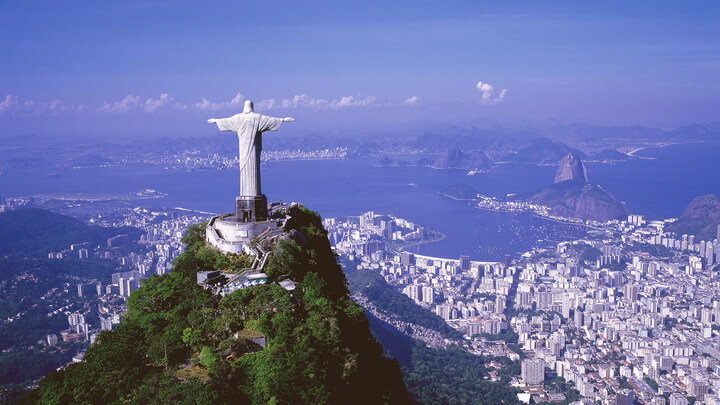Buying property in Brazil as a UK foreigner
Read our comprehensive guide to buying property in Brazil as a foreigner, including average prices, fees, taxes and where to start house hunting.

Brazil is huge - the largest country in South America - and all the major cities are home to active communities of expats. International arrivals are drawn by the vibrant culture, beaches and environmental beauty. They can then find work in sectors as diverse as banking and agriculture. Foreigners are well catered for with international schools, clubs and associations helping newcomers to settle.
If you’re thinking of making Brazil your next adventure, and want to work while you're there, then you'll need the right visa. Make sure you have all the right paperwork by checking out this guide to getting a Brazilian work visa.
Although some nationalities might not need a visa to enter Brazil as a tourist, to work there as a foreigner you're highly likely to need a residence permit and a separate work visa. The work visa must be issued outside of Brazil though, so even if you're already in the country, you'll need to apply at your ‘home’ embassy and re-enter Brazil under the terms of your new visa.
It’s advisable to talk to your embassy directly when you're planning your trip as each application is processed according to the local embassy rules.
To work legally in Brazil, you’ll need both a residence permit and a work visa. This is different than many countries where the rights to live and work are wrapped up into one process. So, it’s important you have your work visa before you take up any employment.
You can apply for a work visa as long as you have a residence permit already in place - this can be a temporary or permanent residence visa depending on your personal circumstances. Similarly, the work permit you're issued could be either temporary or permanent. The temporary permits are usually issued for a duration of up to two years and can be reissued once. After a four year period, your employer can apply to switch your permit to a permanent permission to work in Brazil if you wish.
To get a work visa, you must already have a job lined up, as your prospective employer kicks off the visa application process. It’s worth noting that you can only work for this employer when you’re in Brazil. If you do change jobs you’ll need to reapply for a new permit.
Your employer should submit the proposed employment contract along with other required paperwork such as proof of your qualifications and work experience to the Ministry of Labour and Employment. You can follow the status of your visa application on the visa portal of the official website.
Once this has been done, you'll need to make an appointment with your local Brazilian embassy or consulate to continue the visa application process. It’s possible to start completing the visa application forms and upload your passport photograph online. Your local embassy might also require you to take along a printed copy of your application to prove it was properly submitted.
The exact details will vary depending on your nationality and the type of visa that best suits your needs but you can expect processing from this point to take between one and four weeks. All visas must be issued outside of Brazil. This means that, if you're already in the country, on a tourist visa for example and decide to take up employment, you’ll need to leave Brazil to process the visa and re-enter under the conditions of the new visa.
Because each embassy has a different approach to visa processing, it's very important that you talk directly to your local embassy first to leave yourself plenty of time to make arrangements. Some embassies, such as the Brazilian embassy in New York, don't offer visa appointments but rather work on a ‘first come, first served’ basis. This might mean that if you arrive on a busy day you're unable to have your application dealt with. Other embassies offer appointments for applicants so check the details before you make plans to travel.
There are Visa fees involved which vary depending on the visa applied for and your nationality. Along with as a flat administration fee there may also be an added reciprocity fee. As an example, a US citizen applying for a permanent work visa will pay $290.
There are lots of agencies specialised in helping foreigners secure their Brazilian visas. If your situation is at all complex or your employer isn't able to offer any more than the most basic support, then this might be a good option for you. Navigating the Brazilian visa process can be complex and rules can change frequently. If you do choose this route, then please make sure you choose a great agent by taking recommendations and testimonials from others who have used their services and get a full rundown of the services you’re paying for before you hand over any cash.
When you apply at your local consulate for your work visa you'll be asked for a set of documents to support your application. You will be told what you need when you make your appointment as there are slight variations. However, you can expect to need the following:
Valid passport with at least 6 months left to run
Complete application form
Passport sized photos
A clean, recent police report
You may also be able to submit some application documentation online in advance of your appointment. However, your embassy might still require you to take along a printed copy of the documentation you have filed,for their records.
For some nationalities there might be further requirements. For example, if you come from, or have travelled to areas where infectious diseases such as Yellow Fever are prevalent, you might have to provide a medical certificate proving you have a clean bill of health. You may also be required to prove your intention to return at the end of your visa period by proving you have a return ticket booked.
If you’re coming to Brazil on business but don't anticipate being paid by a Brazilian employer during that time, you can apply for a business visa instead of a work visa. This doesn’t require you to have a Brazilian employment contract and prohibits you working directly for a Brazilian business while you’re there. It’s used if you’re offering technical assistance through a contractor, for example.
If you’re planning on being in Brazil for only a few months and have a job lined up already then you can apply for a temporary work permit following the process outlined above.
Another alternative, if you're under 30, and a citizen of an eligible country (currently France Germany, South Korea and New Zealand), is to get a working holiday visa. This is typically issued for up to a year and doesn't require employer sponsorship. There are strict conditions on this visa type though and the intended purpose is for people looking to spend their time in Brazil for the purpose of tourism. Your embassy can able to tell you if you’re eligible for this visa type.
The ‘Investment’ pages of the website of the Presidency of Brazil is a good place to start when looking for details of how best to set up a business or invest in an existing business in Brazil.
To be issued a visa under the investment stream, you must be investing in the region of R$500,000 directly in Brazil. The exact amounts do vary according to the sector and the nature of the work you intend to do. Your Brazilian registered company will have to apply directly to the Ministry of Labour for permission to operate and apply for a visa on your behalf.
Because there are various different options for coming to Brazil as an entrepreneur, it's a good idea to talk to an immigration lawyer or reputable visa agency before you go too far in your plans.
Whether or not you can bring family members to Brazil depends on on the terms of your residency as well as your work permit. Your local Brazilian embassy will be able to advise you on your options with this.
As an example, to apply for a family reunification visa as an American citizen, you must be the spouse or dependant of a permanent resident, and must apply to the embassy closest to your home. You also need to prove that you have lived in the region of that embassy over the past year, as well as fulfilling other eligibility criteria and paying a fee.
Once you arrive in Brazil you should apply for a Foreigner’s Identity Card, known as a CIE. To do this, you must complete the application form and make a payment which can be done at any bank or post office. You then take the required documents and proof of payment to your local federal police office to get your card.
The website of the Presidency of Brazil is a good place to look for general information about settling in Brazil and answers many questions about legal or process matters.
To get the most of your money in Brazil, you'll want to open a bank account in Brazil, which you can do before you arrive.
Once you send money either to or from Brazil, consider using a money conversion service like Wise to avoid unfair exchange rates. There's a small transparent fee, and when your money is converted from one currency to another you’ll get the real exchange rate - the same one you can find on Google. Not only that, but Wise receives and sends money via local bank transfers instead of internationally, further saving you money by cutting out hefty international transfer fees.
If your trip is short or opening a bank account in Brazil isn't an option, you can always withdraw money from your foreign account using an ATM there. Just keep in mind it'll be more favourable to agree to be charged in the local currency, not your home currency.
Regardless of when you start your new job abroad, it should be fairly straightforward to get yourself a visa if you follow the right steps. The most important part is just to make sure to enjoy your new adventure.
*Please see terms of use and product availability for your region or visit Wise fees and pricing for the most up to date pricing and fee information.
This publication is provided for general information purposes and does not constitute legal, tax or other professional advice from Wise Payments Limited or its subsidiaries and its affiliates, and it is not intended as a substitute for obtaining advice from a financial advisor or any other professional.
We make no representations, warranties or guarantees, whether expressed or implied, that the content in the publication is accurate, complete or up to date.

Read our comprehensive guide to buying property in Brazil as a foreigner, including average prices, fees, taxes and where to start house hunting.

Read our complete guide to the Brazil digital nomad visa, covering fees, documents, eligibility requirements and application process.

If you’re from the UK and planning a trip to Brazil - or elsewhere for that matter - you might have heard of the Wise card as a smart multi-currency debit...

Let’s face it, Brazil isn’t known for their world class education system. Ranked #32 in the world for their schools, the South American country has faced a...

Brazil is the largest country in South America, but most of the nation’s population lives in cities. In fact, about 82 of every 100 Brazilians reside in urban...

Rio de Janeiro is one of the richest cities in Latin America, with a diverse economy covering finance, manufacturing and tourism among its developed sectors....